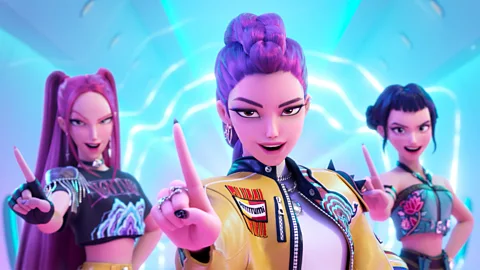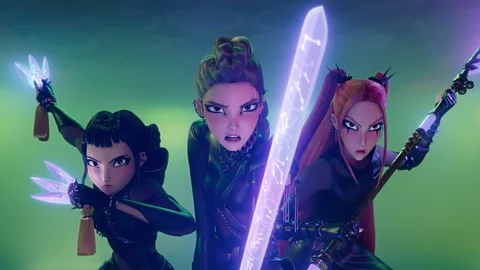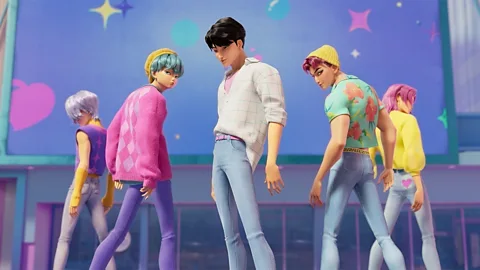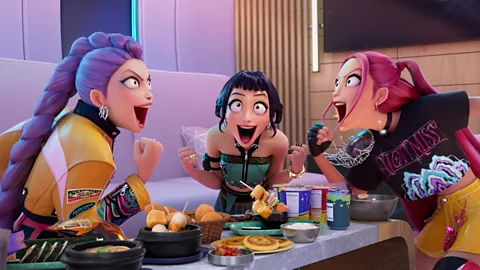KPop Demon Hunters: How the Netflix film became a global sensation
 Netflix
NetflixSince its release in June, KPop Demon Hunters has topped global Netflix charts and dominated global music charts – what's the secret to its extraordinary success?
Whether you're a devoted K-pop fan or not, you may have heard of this new global sensation. The animated film KPop Demon Hunters has quickly become a worldwide hit, topping Netflix's global charts with more than 33 million views in just two weeks, reaching the top 10 in 93 countries (it's currently at number two globally). It has its own fan art and audiences around the world are already demanding a sequel.
It's not just the film that's making waves. Since its release on 20 June, two fictional bands featured in the story – the righteous girl group Huntr/x and their rebellious counterparts Saja Boys – have dominated the global music charts, even surpassing K-pop powerhouses like BTS and Blackpink. Seven tracks from the film's soundtrack are now featured on the Billboard Hot 100. Their songs have risen to the top of Spotify's US chart, landing in the first and second spots. So, what's behind this extraordinary success and why does it resonate so strongly with global audiences?
KPop Demon Hunters follows the story of Huntr/x, an all-female K-pop group (Rumi, Mira and Zoey) who double as secret guardians of the world. Beyond the glamour of the stage, these global superstars protect their fans from supernatural threats, squaring off against their villainous counterparts Saja Boys. This animated film blends action with a story about friendship, trust and staying true to your identity. With its dazzling visuals, slick action sequences, humour and a splash of fantasy, along with a universal message about self-discovery, it's easy to see the appeal.
 Netflix
NetflixBut it's the film's music that has been the key to its success. Maggie Kang, the Korean-Canadian co-director of the film, was apparently inspired by the K-pop idols she admired growing up. K-pop is the film's heartbeat. The group's music becomes a supernatural weapon that wards off dark forces. Each original track amplifies emotional moments. "Unlike other animated films, where songs are often added as a filler or commercial hook, the music here was woven into the narrative in a way that enhanced it rather than distracted," Lashai Ben Salmi, community leader with a focus on Korean culture in Europe, tells the BBC. "It gives the film a surprising level of maturity."
Knowing how vital the soundtrack would be, directors Maggie Kang and Chris Appelhans tapped into the expertise of seasoned K-pop producers. K-pop has evolved into a multi-billion-dollar industry, fuelled by a devoted global fanbase and known for its catchy, meticulously produced music, high-energy choreography and visually stunning music videos.
"Because we wanted the music to be really incredible and really speak to the K-pop fans and be legitimately fit into the K-pop space, we felt that it was important to partner with a Korean label," Kang said during a Netflix press interview. The film was made possible with the help of top music producers, including Teddy Park, known for his work with Blackpink, and Grammy-winning Lindgren, who has worked with BTS and TWICE.
 Netflix
NetflixAmanda Golka, a young content creator based in LA, tells the BBC that she isn't deeply into K-pop but has become obsessed with the film and the songs. "I have been blasting the soundtrack from Spotify every time I'm in the car" she says. "I always find it fascinating through different cultures the universal language that is music."
Kim Youngdae, a music critic and ethnomusicologist specialising in K-pop, says that the series appeals even to those who have little interest in K-pop or are simply curious about it. "For the past 20 or 30 years, K-pop has really struggled to figure out how to naturally integrate into what we call the mainstream of pop culture, like in the US or the UK… because of the cultural barriers," he tells the BBC. "But animation is a very effective way to introduce unfamiliar cultures to mainstream platforms."
Tradition meets trend
Another key reason for the film's popularity is the world's growing familiarity with Korean culture. K-pop, K-film and K-dramas have already become mainstream in Western markets like the US, and this film reflects that cultural shift with remarkable authenticity. It carefully weaves in everyday elements of Korean life, especially around food and dining customs, which are an essential part of Korean culture. It also captures scenes from places like the ancient walls overlooking Seoul, Hanuiwon (traditional Korean medicine clinics), public bathhouses and the iconic Namsan Tower. These choices reflect a conscious effort to portray Korean culture beyond clichés and superficial imagery. It offers Korean viewers a rare sense of representation that feels both accurate and respectful.
To achieve this level of authenticity, the production team travelled to South Korea and carried out extensive research into both traditional and modern aspects of Korean culture, from traditional clothing to the landmarks of Seoul. "We went to folk villages, we looked at what the bricks look like and how the streets are designed in Myeongdong. We took pictures because capturing the feeling is so important," Kang said. "We tried to make the movie feel as Korean as possible. And one way to do that was to, in every scene and every design aspect, add in Korean elements."
 Netflix
NetflixOne of the examples of this cultural sensitivity is in the animation itself. Although the characters speak English in the final version, the animators designed their mouth movements to match the shapes of Korean pronunciation. The characters' reactions are authentically Korean, and they also speak or sing some Korean words. "We animated the film with the idea that we wanted to make sure that all of those things sounded Korean, and that the reactions of the characters felt Korean too," Kang said.
Moreover, the film vividly captures the unique culture of K-pop, immersing viewers in the world of fandom. It includes authentic details such as fan signing events, colourful light sticks, and Korean placards. The Huntr/x and Saja Boys perform perfectly synchronised dances – known as Kalgunmu in Korean. With its deep understanding of K-pop fan culture, the film invites audiences to connect with the characters as if they were real idols.
"Because the concept was K-pop, it was able to include a wide range of K-pop bands. It's not about one particular group or one particular era - it's about the whole culture of K-pop," Kim said. "K-pop fans often focus on individual groups, but this film embraces the broader culture of K-pop as a whole."
And the film creates a unique blend of traditional Korean culture with contemporary K-pop. The girl group Huntr/x's use of swords and fans recalls Korean shamans called Mudang, while their rivals the Saja Boys represent evil spirits dressed like the Korean Grim Reaper. Korean shamanism appears in symbolic elements like Dangsan trees (deified tree) and Dokkaebi (Korean goblins). Even the weapons draw on traditional Korean designs, while their stage backdrop features traditional Korean paintings. Two mascots: Derpy, a tiger, and Sussy, a magpie, hold special meaning in late Joseon folk tales, symbolising guardianship and good fortune.
Beneath its vibrant surface, the film carries a universal message about characters who struggle with self-acceptance but ultimately reclaim their true identities. It's a coming-of-age journey that resonates across cultures. Even those unfamiliar with K-pop or Korean traditions can connect with its themes.
"[It's about] self-acceptance" says Golka. "Your friends may not understand right away, but… they do love you and they will figure it out. I think that has really resonated with people."
KPop Demon Hunters is available to stream on Netflix.
--
If you liked this story, sign up for The Essential List newsletter – a handpicked selection of features, videos and can't-miss news, delivered to your inbox twice a week.
